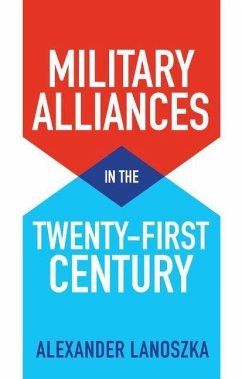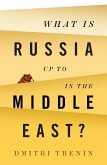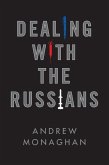Alliance politics is a regular headline grabber. When a possible military crisis involving Russia, North Korea, or China rears its head, leaders and citizens alike raise concerns over the willingness of US allies to stand together. As rival powers have tightened their security cooperation, the United States has stepped up demands that its allies increase their defense spending and contribute more to military operations in the Middle East and elsewhere. The prospect of former President Donald Trump unilaterally ending alliances alarmed longstanding partners, even as NATO was welcoming new members into its ranks.
Military Alliances in the Twenty-First Century is the first book to explore fully the politics that shape these security arrangements - from their initial formation through the various challenges that test them and, sometimes, lead to their demise. Across six thematic chapters, Alexander Lanoszka challenges conventional wisdom that has dominated our understanding of how military alliances have operated historically and into the present. Although military alliances today may seem uniquely hobbled by their internal difficulties, Lanoszka argues that they are in fact, by their very nature, prone to dysfunction.
Hinweis: Dieser Artikel kann nur an eine deutsche Lieferadresse ausgeliefert werden.
Military Alliances in the Twenty-First Century is the first book to explore fully the politics that shape these security arrangements - from their initial formation through the various challenges that test them and, sometimes, lead to their demise. Across six thematic chapters, Alexander Lanoszka challenges conventional wisdom that has dominated our understanding of how military alliances have operated historically and into the present. Although military alliances today may seem uniquely hobbled by their internal difficulties, Lanoszka argues that they are in fact, by their very nature, prone to dysfunction.
Hinweis: Dieser Artikel kann nur an eine deutsche Lieferadresse ausgeliefert werden.
"Elegant, engaging, and important. Alexander Lanoszka provides a masterclass on the origins and workings of modern military alliances. This is essential reading for today's debates on international relations and the future of American grand strategy."
G. John Ikenberry, Princeton University
"Alliances are a foundational building block of the international order, but academics and practitioners have slighted the study of alliance management. Alexander Lanoszka provides a remedy with a scintillating tour d'horizon of the promise and perils of alliances in the twenty-first century."
Eric S. Edelman, Former Under-Secretary of Defense for Policy
"This book is a must-read for anyone interested in the dynamics and politics of military alliances. It offers both a concise, coherent, and insightful synthesis of existing scholarship as well as cogent, original arguments on classic questions of alliance politics."
Brian Blankenship, University of Miami
"In this excellent book, Lanoszka reviews, refreshes and challenges the scholarly debates on alliance politics. This is a book for both the student and scholar: for those seeking to understand alliances, and those whose understanding needs to be further refined."
Iain D. Henry, Australian National University
G. John Ikenberry, Princeton University
"Alliances are a foundational building block of the international order, but academics and practitioners have slighted the study of alliance management. Alexander Lanoszka provides a remedy with a scintillating tour d'horizon of the promise and perils of alliances in the twenty-first century."
Eric S. Edelman, Former Under-Secretary of Defense for Policy
"This book is a must-read for anyone interested in the dynamics and politics of military alliances. It offers both a concise, coherent, and insightful synthesis of existing scholarship as well as cogent, original arguments on classic questions of alliance politics."
Brian Blankenship, University of Miami
"In this excellent book, Lanoszka reviews, refreshes and challenges the scholarly debates on alliance politics. This is a book for both the student and scholar: for those seeking to understand alliances, and those whose understanding needs to be further refined."
Iain D. Henry, Australian National University








